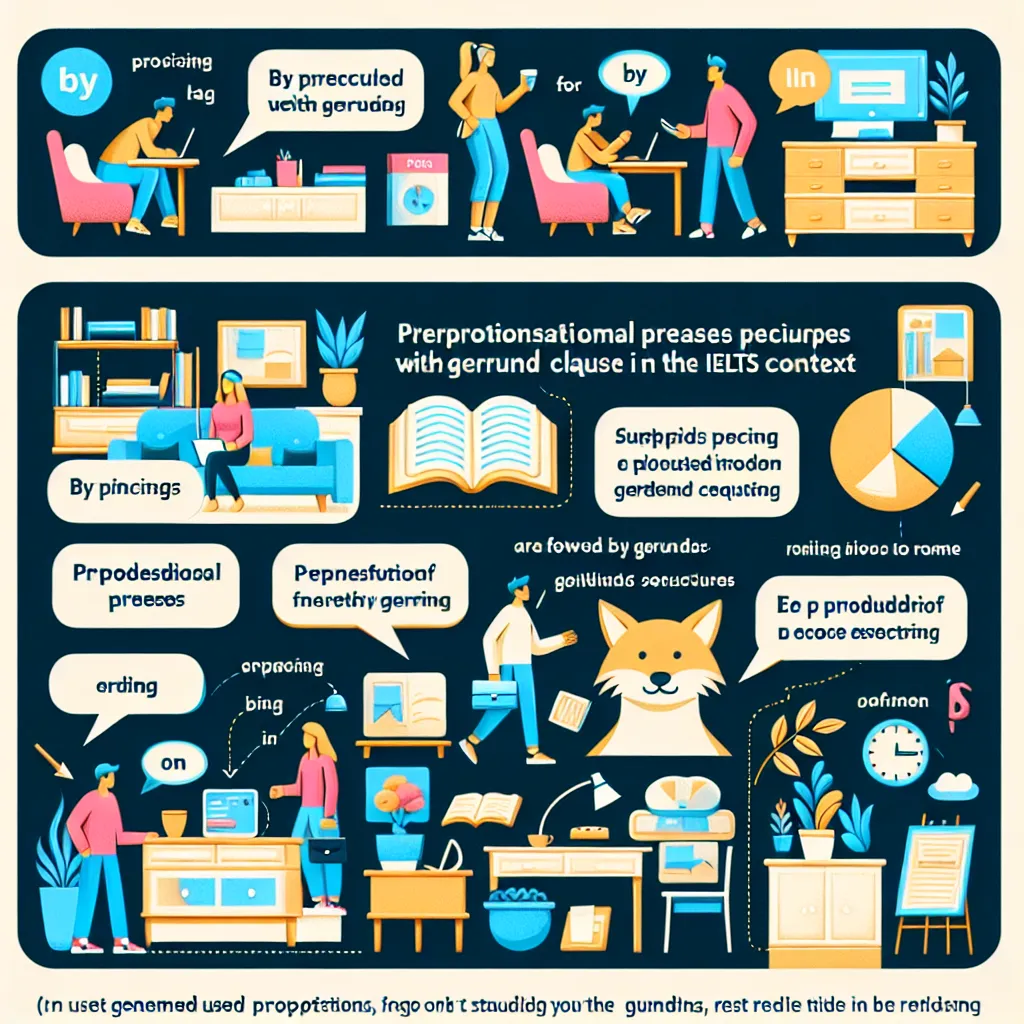Prepositional phrases with gerund clauses are a crucial grammatical structure that frequently appears in IELTS exams. These phrases combine prepositions with gerunds (verbs ending in -ing used as nouns) to express various relationships between actions or ideas. Mastering this structure can significantly enhance your performance across all sections of the IELTS test. Let’s dive into the intricacies of this grammar point and explore how to use it effectively in your IELTS preparation.
 Prepositional Phrases with Gerund Clauses
Prepositional Phrases with Gerund Clauses
Understanding Prepositional Phrases with Gerund Clauses
Prepositional phrases with gerund clauses consist of a preposition followed by a gerund or gerund phrase. This structure is commonly used to express purpose, cause, manner, or time relationships between actions. In IELTS, you’ll encounter these phrases in reading passages, listening scripts, and they’re particularly useful in writing and speaking tasks to demonstrate grammatical range and accuracy.
Common Prepositions Used with Gerunds
Some of the most frequently used prepositions in this structure include:
- by
- for
- in
- on
- about
- without
- before
- after
For example:
- “By practicing regularly, IELTS candidates can improve their scores.” (expressing manner)
- “The city invested in infrastructure for reducing traffic congestion.” (expressing purpose)
- “She excels in solving complex problems quickly.” (expressing area of skill)
Grammar Formula and Usage in IELTS
The basic formula for prepositional phrases with gerund clauses is:
[Preposition] + [Gerund/Gerund Phrase]
This structure can be used in various parts of a sentence, such as:
- As a subject complement: “The key to success is in persevering through challenges.”
- As an adverbial phrase: “Without studying consistently, it’s difficult to achieve a high IELTS score.”
- As part of a noun phrase: “The importance of developing critical thinking skills cannot be overstated.”
Application in IELTS Writing
In IELTS Writing Task 2, using prepositional phrases with gerund clauses can help you express complex ideas concisely and demonstrate grammatical sophistication. For instance:
“Many argue that the solution to urban pollution lies in promoting sustainable transportation methods. By encouraging the use of bicycles and public transport, cities can significantly reduce their carbon footprint. Moreover, instead of relying on personal vehicles, people should consider alternatives for commuting to work.”
This paragraph showcases multiple uses of the structure, adding variety and complexity to the writing.
Utilization in IELTS Speaking
For the Speaking test, incorporating these phrases can help you provide more detailed and nuanced responses:
Examiner: “What do you think are the benefits of learning a new language?”
Candidate: “I believe there are numerous advantages to learning a new language. Aside from improving one’s career prospects, it’s excellent for developing cognitive skills. By immersing oneself in a different culture through language, one gains a broader perspective on the world. Additionally, it’s great for making new friends and connections across cultural boundaries.”
Strategies for Achieving Higher Band Scores
To achieve higher band scores in IELTS, it’s crucial to use prepositional phrases with gerund clauses accurately and appropriately. Here’s how you can elevate your usage:
Band 6-6.5:
Use basic prepositional phrases with gerund clauses correctly:
- “I’m interested in learning new languages.”
- “She’s good at solving mathematical problems.”
Band 7-7.5:
Incorporate more varied and complex structures:
- “Despite facing numerous challenges, she persevered in pursuing her goals.”
- “The company focuses on developing sustainable solutions for reducing environmental impact.”
Band 8-9:
Demonstrate mastery by using these phrases in sophisticated contexts and combining them with other advanced structures:
- “In addition to excelling in academic pursuits, successful candidates often distinguish themselves by engaging in extracurricular activities, thereby demonstrating their ability to balance multiple commitments.”
- “The efficacy of the new policy lies not merely in implementing stricter regulations, but in fostering a culture of responsibility among citizens, thus ensuring long-term compliance without resorting to punitive measures.”
Common Errors and How to Avoid Them
When using prepositional phrases with gerund clauses, IELTS candidates often make the following mistakes:
-
Using an infinitive instead of a gerund:
Incorrect: “She’s interested in to learn English.”
Correct: “She’s interested in learning English.” -
Omitting the preposition:
Incorrect: “I’m looking forward seeing you soon.”
Correct: “I’m looking forward to seeing you soon.” -
Using the wrong preposition:
Incorrect: “He’s good on playing the piano.”
Correct: “He’s good at playing the piano.” -
Forgetting to use the gerund form:
Incorrect: “They insisted on we leave early.”
Correct: “They insisted on our leaving early.” or “They insisted that we leave early.”
To avoid these errors, practice using these structures regularly and pay close attention to the correct prepositions that pair with specific verbs or adjectives.
Conclusion
Mastering prepositional phrases with gerund clauses is essential for achieving a high score in IELTS. By incorporating these structures into your language use, you demonstrate grammatical range and accuracy, which are key criteria in the IELTS assessment. Remember to practice using these phrases in various contexts, particularly in Writing Task 2 essays and Speaking Part 3 discussions where you need to express complex ideas and relationships between concepts.
For further practice, try incorporating these structures into essays on topics such as environmental conservation, technological advancements, or educational reforms. Pay attention to how these phrases can help you connect ideas smoothly and express yourself more precisely. With consistent practice and awareness, you’ll find yourself using prepositional phrases with gerund clauses naturally and effectively in your IELTS responses.
Learn more about employer-employee dynamics in the gig economy to expand your vocabulary and practice using prepositional phrases with gerund clauses in a relevant context.


